Deck 1: Functions and Graphs
Question
Question
Question
Question
Question
Question
Question
Question
Question
Question
Question
Question
Question
Question
Question
Question
Question
Question
Question
Question
Question
Question
Question
Question
Question
Question
Question
Question
Question
Question
Question
Question
Question
Question
Question
Question
Question
Question
Question
Question
Question
Question
Question
Question
Question
Question
Question
Question
Question
Question
Question
Question
Question
Question
Question
Question
Question
Question
Question
Question
Question
Question
Question
Question
Question
Question
Question
Question
Question
Question
Question
Question
Question
Question
Question
Question
Question
Question
Question
Question

Unlock Deck
Sign up to unlock the cards in this deck!
Unlock Deck
Unlock Deck
1/224
Play
Full screen (f)
Deck 1: Functions and Graphs
1
Determine whether the relation represents a function. If it is a function, state the domain and range.
{(-4, 19), (-3, 12), (0, 3), (3, 12), (5, 28)}
A)
B)
C) not a function
{(-4, 19), (-3, 12), (0, 3), (3, 12), (5, 28)}
A)

B)

C) not a function

2
The graph of a function f is given. Use the graph to answer the question.
Use the graph of f given below to find f(-50).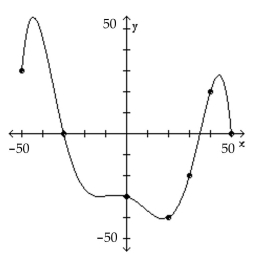
A) -50
B) 30
C) 0
D) 80
Use the graph of f given below to find f(-50).

A) -50
B) 30
C) 0
D) 80
30
3
Find the function value.
Given that
A)
B)
C) 3t + 6
D)
Given that

A)

B)

C) 3t + 6
D)


4
Provide an appropriate response.
For f(t) = 3t + 2 and g(t) = 2 - find 4f(3) - g(-3) + g(0).
find 4f(3) - g(-3) + g(0).
For f(t) = 3t + 2 and g(t) = 2 -
 find 4f(3) - g(-3) + g(0).
find 4f(3) - g(-3) + g(0).
Unlock Deck
Unlock for access to all 224 flashcards in this deck.
Unlock Deck
k this deck
5
Determine whether the function is linear, constant, or neither

A) Linear
B) Constant
C) Neither

A) Linear
B) Constant
C) Neither

Unlock Deck
Unlock for access to all 224 flashcards in this deck.
Unlock Deck
k this deck
6
Determine whether the relation represents a function. If it is a function, state the domain and range.

A) function domain: {Bob, Ann, Dave}
Range: {carrots, peas, squash}
B) function domain: {carrots, peas, squash}
Range: {Bob, Ann, Dave}
C) not a function

A) function domain: {Bob, Ann, Dave}
Range: {carrots, peas, squash}
B) function domain: {carrots, peas, squash}
Range: {Bob, Ann, Dave}
C) not a function

Unlock Deck
Unlock for access to all 224 flashcards in this deck.
Unlock Deck
k this deck
7
Determine whether the graph is the graph of a function.
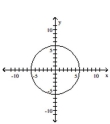
A) function
B) not a function

A) function
B) not a function

Unlock Deck
Unlock for access to all 224 flashcards in this deck.
Unlock Deck
k this deck
8
Use point-by-point plotting to sketch the graph of the equation.
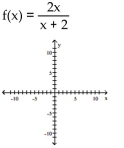
A)
B)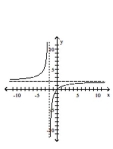
C)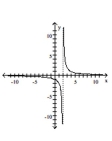
D)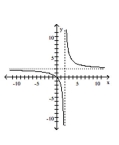

A)

B)

C)

D)


Unlock Deck
Unlock for access to all 224 flashcards in this deck.
Unlock Deck
k this deck
9
Determine whether the function is linear, constant, or neither

A) Linear
B) Constant
C) Neither

A) Linear
B) Constant
C) Neither

Unlock Deck
Unlock for access to all 224 flashcards in this deck.
Unlock Deck
k this deck
10
Determine whether the relation represents a function. If it is a function, state the domain and range.

A) function domain: {4, 6, 8, 10} Range: {24, 36, 48, 60}
B) function domain:{24, 36, 48, 60} range: {4, 6, 8, 10}
C) not a function

A) function domain: {4, 6, 8, 10} Range: {24, 36, 48, 60}
B) function domain:{24, 36, 48, 60} range: {4, 6, 8, 10}
C) not a function

Unlock Deck
Unlock for access to all 224 flashcards in this deck.
Unlock Deck
k this deck
11
Determine whether the relation represents a function. If it is a function, state the domain and range.
{(41, -3), (5, -2), (5, 0), (9, 2), (21, 4)}
A)
B)
C) not a function
{(41, -3), (5, -2), (5, 0), (9, 2), (21, 4)}
A)

B)

C) not a function

Unlock Deck
Unlock for access to all 224 flashcards in this deck.
Unlock Deck
k this deck
12
Find the function value.
Find f(-6) when
A) 27
B) 45
C) 117
D) -99
Find f(-6) when

A) 27
B) 45
C) 117
D) -99

Unlock Deck
Unlock for access to all 224 flashcards in this deck.
Unlock Deck
k this deck
13
Use point-by-point plotting to sketch the graph of the equation.
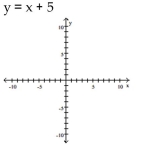
A)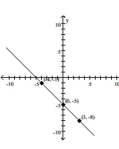
B)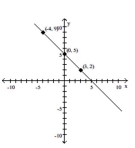
C)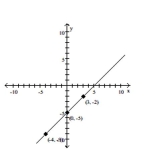
D)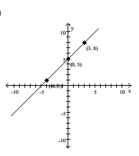

A)

B)

C)

D)


Unlock Deck
Unlock for access to all 224 flashcards in this deck.
Unlock Deck
k this deck
14
Determine whether the graph is the graph of a function.
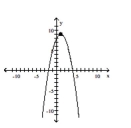
A) function
B) not a function

A) function
B) not a function

Unlock Deck
Unlock for access to all 224 flashcards in this deck.
Unlock Deck
k this deck
15
Find the function value.

A)
B)
C)
D)

A)

B)

C)

D)


Unlock Deck
Unlock for access to all 224 flashcards in this deck.
Unlock Deck
k this deck
16
Use point-by-point plotting to sketch the graph of the equation.
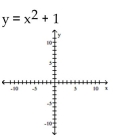
A)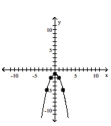
B)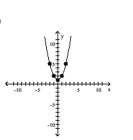
C)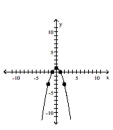
D)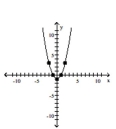

A)

B)

C)

D)


Unlock Deck
Unlock for access to all 224 flashcards in this deck.
Unlock Deck
k this deck
17
Determine whether the function is linear, constant, or neither

A) Linear
B) Constant
C) Neither

A) Linear
B) Constant
C) Neither

Unlock Deck
Unlock for access to all 224 flashcards in this deck.
Unlock Deck
k this deck
18
Determine whether the function is linear, constant, or neither
y - 12 = 0
A) Linear
B) Constant
C) Neither
y - 12 = 0
A) Linear
B) Constant
C) Neither

Unlock Deck
Unlock for access to all 224 flashcards in this deck.
Unlock Deck
k this deck
19
Determine whether the graph is the graph of a function.
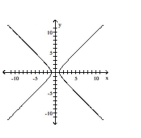
A) function
B) not a function

A) function
B) not a function

Unlock Deck
Unlock for access to all 224 flashcards in this deck.
Unlock Deck
k this deck
20
Provide an appropriate response.
If , find g(-2), g(1), and
, find g(-2), g(1), and 
If
 , find g(-2), g(1), and
, find g(-2), g(1), and 

Unlock Deck
Unlock for access to all 224 flashcards in this deck.
Unlock Deck
k this deck
21
Determine the domain of the function.

A) x < 2
B) No solution
C) All real numbers
D) All real numbers except 2

A) x < 2
B) No solution
C) All real numbers
D) All real numbers except 2

Unlock Deck
Unlock for access to all 224 flashcards in this deck.
Unlock Deck
k this deck
22
Provide an appropriate response.

A)
B) Not a function; for example, when x = 10, y = ±1

A)

B) Not a function; for example, when x = 10, y = ±1

Unlock Deck
Unlock for access to all 224 flashcards in this deck.
Unlock Deck
k this deck
23
Solve the problem.
To estimate the ideal minimum weight of a woman in pounds multiply her height in inches by 4 and subtract 130. Let W = the ideal minimum weight and h = height. W is a linear function of h. Find the ideal minimum
Weight of a woman whose height is 62 inches.
A) 120 lb
B) 378 lb
C) 118 lb
D) 130 lb
To estimate the ideal minimum weight of a woman in pounds multiply her height in inches by 4 and subtract 130. Let W = the ideal minimum weight and h = height. W is a linear function of h. Find the ideal minimum
Weight of a woman whose height is 62 inches.
A) 120 lb
B) 378 lb
C) 118 lb
D) 130 lb

Unlock Deck
Unlock for access to all 224 flashcards in this deck.
Unlock Deck
k this deck
24
Provide an appropriate response.
For f(t) = 3 - 5t, find
For f(t) = 3 - 5t, find


Unlock Deck
Unlock for access to all 224 flashcards in this deck.
Unlock Deck
k this deck
25
Solve the problem.
To estimate the ideal minimum weight of a woman in pounds multiply her height in inches by 4 and subtract 130. Let W = the ideal minimum weight and h = height. Express W as a linear function of h.
A) W(h) = 4h - 130
B) W(h) = 130h + 4
C) W(h) = 130
D) W(h) = 4 (h + 130)
To estimate the ideal minimum weight of a woman in pounds multiply her height in inches by 4 and subtract 130. Let W = the ideal minimum weight and h = height. Express W as a linear function of h.
A) W(h) = 4h - 130
B) W(h) = 130h + 4
C) W(h) = 130
D) W(h) = 4 (h + 130)

Unlock Deck
Unlock for access to all 224 flashcards in this deck.
Unlock Deck
k this deck
26
Solve the problem.
The function M described by M(x) = 2.89x + 70.64 can be used to estimate the height, in centimeters, of a male whose humerus (the bone from the elbow to the shoulder) is x cm long. Estimate the height of a male whose
Humerus is 30.93 cm long. Round your answer to the nearest four decimal places.
A) 157.3400 m
B) 160.0277 cm
C) 30.9300 cm
D) 156.5375 cm
The function M described by M(x) = 2.89x + 70.64 can be used to estimate the height, in centimeters, of a male whose humerus (the bone from the elbow to the shoulder) is x cm long. Estimate the height of a male whose
Humerus is 30.93 cm long. Round your answer to the nearest four decimal places.
A) 157.3400 m
B) 160.0277 cm
C) 30.9300 cm
D) 156.5375 cm

Unlock Deck
Unlock for access to all 224 flashcards in this deck.
Unlock Deck
k this deck
27
Solve the problem.
The point at which a company's costs equals its revenue is the break-even. C represents cost, in dollars, of x units of a product. R represents the revenue, in dollars, for the sale of x units. Find the number of units that must be produced
And sold in order to break even.
A) 6000
B) 545
C) 800
D) 12,000
The point at which a company's costs equals its revenue is the break-even. C represents cost, in dollars, of x units of a product. R represents the revenue, in dollars, for the sale of x units. Find the number of units that must be produced
And sold in order to break even.

A) 6000
B) 545
C) 800
D) 12,000

Unlock Deck
Unlock for access to all 224 flashcards in this deck.
Unlock Deck
k this deck
28
Provide an appropriate response.
Only one of the following functions has domain which is not equal to all real numbers. State which function and state its
domain.
(A) (B)
(B)  (C)
(C) 
Only one of the following functions has domain which is not equal to all real numbers. State which function and state its
domain.
(A)
 (B)
(B)  (C)
(C) 

Unlock Deck
Unlock for access to all 224 flashcards in this deck.
Unlock Deck
k this deck
29
Determine the domain of the function.

A) x < 3
B) All real numbers except 3
C)
D) No solution

A) x < 3
B) All real numbers except 3
C)

D) No solution

Unlock Deck
Unlock for access to all 224 flashcards in this deck.
Unlock Deck
k this deck
30
Provide an appropriate response.

A) A function with domain all real numbers except x = -3
B)

A) A function with domain all real numbers except x = -3
B)


Unlock Deck
Unlock for access to all 224 flashcards in this deck.
Unlock Deck
k this deck
31
Provide an appropriate response.
xy = -9
A) A function with domain all real numbers except x = 0
B)
xy = -9
A) A function with domain all real numbers except x = 0
B)


Unlock Deck
Unlock for access to all 224 flashcards in this deck.
Unlock Deck
k this deck
32
Provide an appropriate response.

A) A function with domain all real numbers except x = 5
B)

A) A function with domain all real numbers except x = 5
B)


Unlock Deck
Unlock for access to all 224 flashcards in this deck.
Unlock Deck
k this deck
33
Solve the problem.
The function F described by F(x) = 2.75x + 71.48 can be used to estimate the height, in centimeters, of a woman whose humerus (the bone from the elbow to the shoulder) is x cm long. Estimate the height of a woman whose
Humerus is 30.93 cm long. Round your answer to the nearest four decimal places.
A) 105.1600 cm
B) 156.5375 cm
C) 13.5775 cm
D) 43.3000 cm
The function F described by F(x) = 2.75x + 71.48 can be used to estimate the height, in centimeters, of a woman whose humerus (the bone from the elbow to the shoulder) is x cm long. Estimate the height of a woman whose
Humerus is 30.93 cm long. Round your answer to the nearest four decimal places.
A) 105.1600 cm
B) 156.5375 cm
C) 13.5775 cm
D) 43.3000 cm

Unlock Deck
Unlock for access to all 224 flashcards in this deck.
Unlock Deck
k this deck
34
Determine the domain of the function.
f(x) = 8 x3
A) x < 0
B) All real numbers
C) No solution
D) All real numbers except 0
f(x) = 8 x3
A) x < 0
B) All real numbers
C) No solution
D) All real numbers except 0

Unlock Deck
Unlock for access to all 224 flashcards in this deck.
Unlock Deck
k this deck
35
Determine the domain of the function.
f(x) = - 7x + 9
A) No solution
B)
C) All real numbers
D)
f(x) = - 7x + 9
A) No solution
B)

C) All real numbers
D)


Unlock Deck
Unlock for access to all 224 flashcards in this deck.
Unlock Deck
k this deck
36
Solve the problem.
The function P, given by , gives the pressure, in atmospheres (atm), at a depth d, in feet, under the sea. Find the pressure at 200 feet. Round your answer to the nearest whole number.
, gives the pressure, in atmospheres (atm), at a depth d, in feet, under the sea. Find the pressure at 200 feet. Round your answer to the nearest whole number.
A) 7 atm
B) 200 atm
C) 201 atm
D) 8 atm
The function P, given by
 , gives the pressure, in atmospheres (atm), at a depth d, in feet, under the sea. Find the pressure at 200 feet. Round your answer to the nearest whole number.
, gives the pressure, in atmospheres (atm), at a depth d, in feet, under the sea. Find the pressure at 200 feet. Round your answer to the nearest whole number.A) 7 atm
B) 200 atm
C) 201 atm
D) 8 atm

Unlock Deck
Unlock for access to all 224 flashcards in this deck.
Unlock Deck
k this deck
37
Provide an appropriate response.
f(x) = + 7x
+ 7x
A) 15x - 7h + 14
B) 10x + 7
C) + 5h+ 7x
+ 5h+ 7x
D) 10x + 5h + 7
f(x) =
 + 7x
+ 7xA) 15x - 7h + 14
B) 10x + 7
C)
 + 5h+ 7x
+ 5h+ 7xD) 10x + 5h + 7

Unlock Deck
Unlock for access to all 224 flashcards in this deck.
Unlock Deck
k this deck
38
Provide an appropriate response.

A)
B) Not a function; for example, when x = -1, then y = ±1

A)

B) Not a function; for example, when x = -1, then y = ±1

Unlock Deck
Unlock for access to all 224 flashcards in this deck.
Unlock Deck
k this deck
39
Provide an appropriate response.
In a profit-loss analysis, point where revenue equals cost.
A) inflection point
B) break-even point
C) turning point
D) profit-loss point
In a profit-loss analysis, point where revenue equals cost.
A) inflection point
B) break-even point
C) turning point
D) profit-loss point

Unlock Deck
Unlock for access to all 224 flashcards in this deck.
Unlock Deck
k this deck
40
Provide an appropriate response.

A)
B) Not a function; for example, when x = 0, y = ±6

A)

B) Not a function; for example, when x = 0, y = ±6

Unlock Deck
Unlock for access to all 224 flashcards in this deck.
Unlock Deck
k this deck
41
Provide an appropriate response.
The following graph represents the result of applying a sequence of transformations to the graph of a basic
function. Identify the basic function and describe the transformation(s). Write the equation for the given graph.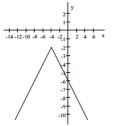
The following graph represents the result of applying a sequence of transformations to the graph of a basic
function. Identify the basic function and describe the transformation(s). Write the equation for the given graph.


Unlock Deck
Unlock for access to all 224 flashcards in this deck.
Unlock Deck
k this deck
42
Provide an appropriate response.

A) Range: all real numbers
Range: all real numbers
B)
C) Domain: all real numbers; Range: all real numbers
D)

A)
 Range: all real numbers
Range: all real numbersB)

C) Domain: all real numbers; Range: all real numbers
D)


Unlock Deck
Unlock for access to all 224 flashcards in this deck.
Unlock Deck
k this deck
43
Write an equation for a function that has a graph with the given transformations.
The shape of is shifted 5 units to the left. Then the graph is shifted 7 units upward.
is shifted 5 units to the left. Then the graph is shifted 7 units upward.
A)
B)
C)
D)
The shape of
 is shifted 5 units to the left. Then the graph is shifted 7 units upward.
is shifted 5 units to the left. Then the graph is shifted 7 units upward.A)

B)

C)

D)


Unlock Deck
Unlock for access to all 224 flashcards in this deck.
Unlock Deck
k this deck
44
Provide an appropriate response.

A)
B)
C)
D)

A)

B)

C)

D)


Unlock Deck
Unlock for access to all 224 flashcards in this deck.
Unlock Deck
k this deck
45
Provide an appropriate response.

A)
B) Range: all real numbers
Range: all real numbers
C) Range: [0, ∞)
Range: [0, ∞)
D)

A)

B)
 Range: all real numbers
Range: all real numbersC)
 Range: [0, ∞)
Range: [0, ∞)D)


Unlock Deck
Unlock for access to all 224 flashcards in this deck.
Unlock Deck
k this deck
46
Provide an appropriate response.

A)
B)
C)
D) Range: all real numbers
Range: all real numbers

A)

B)

C)

D)
 Range: all real numbers
Range: all real numbers
Unlock Deck
Unlock for access to all 224 flashcards in this deck.
Unlock Deck
k this deck
47
Provide an appropriate response.
The following table shows a recent state income tax schedule for married couples filing a joint return in State X. (i) Write a piecewise definition for the tax due T(x) on an income of x dollars. (ii) Graph T(x). (iii) Find the tax due on a taxable income of $50,000. Of $95,000.
(i) Write a piecewise definition for the tax due T(x) on an income of x dollars. (ii) Graph T(x). (iii) Find the tax due on a taxable income of $50,000. Of $95,000. 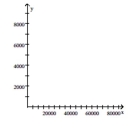
A)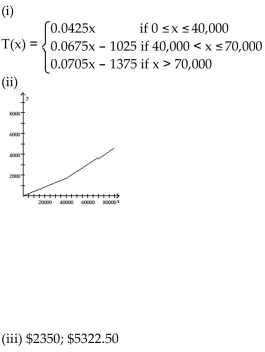
B)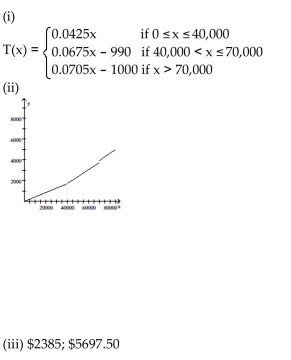
C)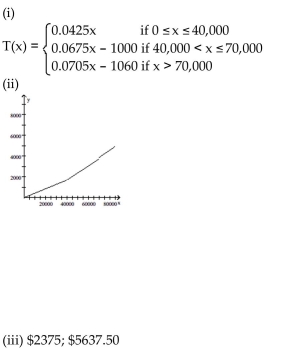
D)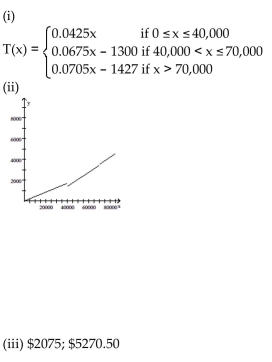
The following table shows a recent state income tax schedule for married couples filing a joint return in State X.
 (i) Write a piecewise definition for the tax due T(x) on an income of x dollars. (ii) Graph T(x). (iii) Find the tax due on a taxable income of $50,000. Of $95,000.
(i) Write a piecewise definition for the tax due T(x) on an income of x dollars. (ii) Graph T(x). (iii) Find the tax due on a taxable income of $50,000. Of $95,000. 
A)

B)

C)

D)


Unlock Deck
Unlock for access to all 224 flashcards in this deck.
Unlock Deck
k this deck
48
Provide an appropriate response.
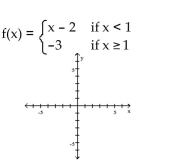
A)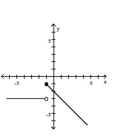
B)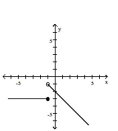
C)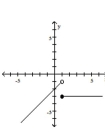
D)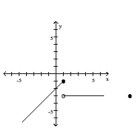

A)

B)

C)

D)


Unlock Deck
Unlock for access to all 224 flashcards in this deck.
Unlock Deck
k this deck
49
Graph the linear equation and determine its slope, if it exists.
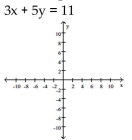
A)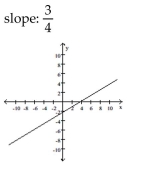
B)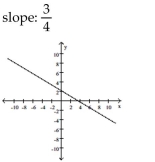
C)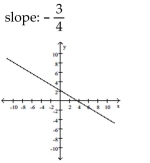
D)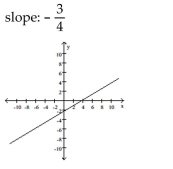

A)

B)

C)

D)


Unlock Deck
Unlock for access to all 224 flashcards in this deck.
Unlock Deck
k this deck
50
Provide an appropriate response.
 what is the definition of g(x), the function whose graph is obtained by shifting
what is the definition of g(x), the function whose graph is obtained by shifting  graph right 5 units and down 1 unit?
graph right 5 units and down 1 unit?
 what is the definition of g(x), the function whose graph is obtained by shifting
what is the definition of g(x), the function whose graph is obtained by shifting  graph right 5 units and down 1 unit?
graph right 5 units and down 1 unit?
Unlock Deck
Unlock for access to all 224 flashcards in this deck.
Unlock Deck
k this deck
51
Provide an appropriate response.
How can the graph of be obtained from the graph of
be obtained from the graph of 
A) Shift it horizontally 1 units to the left. Reflect it across the y-axis.
B) Shift it horizontally -1 units to the left. Reflect it across the x-axis.
C) Shift it horizontally 1 units to the left. Reflect it across the x-axis.
D) Shift it horizontally 1 units to the right. Reflect it across the x-axis.
How can the graph of
 be obtained from the graph of
be obtained from the graph of 
A) Shift it horizontally 1 units to the left. Reflect it across the y-axis.
B) Shift it horizontally -1 units to the left. Reflect it across the x-axis.
C) Shift it horizontally 1 units to the left. Reflect it across the x-axis.
D) Shift it horizontally 1 units to the right. Reflect it across the x-axis.

Unlock Deck
Unlock for access to all 224 flashcards in this deck.
Unlock Deck
k this deck
52
Provide an appropriate response.
The following graph represents the result of applying a sequence of transformations to the graph of a basic
function. Identify the basic function and describe the transformation(s). Write the equation for the given graph.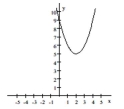
The following graph represents the result of applying a sequence of transformations to the graph of a basic
function. Identify the basic function and describe the transformation(s). Write the equation for the given graph.


Unlock Deck
Unlock for access to all 224 flashcards in this deck.
Unlock Deck
k this deck
53
Find the slope and y intercept of the graph of the equation.
y = 3x - 4
A) Slope = -4, y intercept = 3
B) Slope = 4, y intercept = 3
C) Slope = 3, y intercept = 4
D) Slope = 3, y intercept = -4
y = 3x - 4
A) Slope = -4, y intercept = 3
B) Slope = 4, y intercept = 3
C) Slope = 3, y intercept = 4
D) Slope = 3, y intercept = -4

Unlock Deck
Unlock for access to all 224 flashcards in this deck.
Unlock Deck
k this deck
54
Provide an appropriate response.

A) Range: all real numbers
Range: all real numbers
B)
C)
D)

A)
 Range: all real numbers
Range: all real numbersB)

C)

D)


Unlock Deck
Unlock for access to all 224 flashcards in this deck.
Unlock Deck
k this deck
55
Provide an appropriate response.
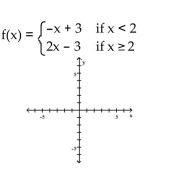
A)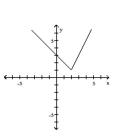
B)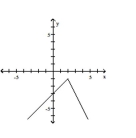
C)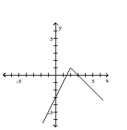
D)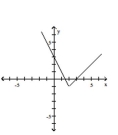

A)

B)

C)

D)


Unlock Deck
Unlock for access to all 224 flashcards in this deck.
Unlock Deck
k this deck
56
Provide an appropriate response.
Let T be the set of teachers at a high school and let S be the set of students enrolled at that school. Determine which of
the following correspondences define a function. Explain.
(A) A student corresponds to the teacher if the student is enrolled in the teacher's class.
(B) A student corresponds to every teacher of the school.
Let T be the set of teachers at a high school and let S be the set of students enrolled at that school. Determine which of
the following correspondences define a function. Explain.
(A) A student corresponds to the teacher if the student is enrolled in the teacher's class.
(B) A student corresponds to every teacher of the school.

Unlock Deck
Unlock for access to all 224 flashcards in this deck.
Unlock Deck
k this deck
57
Provide an appropriate response.
How can the graph of 6 be obtained from the graph of
6 be obtained from the graph of 
A) Shift it horizontally 1 units to the right. Reflect it across the y-axis. Shift it 6 units up.
B) Shift it horizontally 1 units to the right. Reflect it across the x-axis. Shift it 6 units up.
C) Shift it horizontally 1 units to the left. Reflect it across the x-axis. Shift it 6 units up.
D) Shift it horizontally 1 units to the right. Reflect it across the y-axis. Shift it 6 units down.
How can the graph of
 6 be obtained from the graph of
6 be obtained from the graph of 
A) Shift it horizontally 1 units to the right. Reflect it across the y-axis. Shift it 6 units up.
B) Shift it horizontally 1 units to the right. Reflect it across the x-axis. Shift it 6 units up.
C) Shift it horizontally 1 units to the left. Reflect it across the x-axis. Shift it 6 units up.
D) Shift it horizontally 1 units to the right. Reflect it across the y-axis. Shift it 6 units down.

Unlock Deck
Unlock for access to all 224 flashcards in this deck.
Unlock Deck
k this deck
58
Write an equation for a function that has a graph with the given transformations.
The shape of 2 is vertically stretched by a factor of 10, and the resulting graph is reflected across the x-axis.
2 is vertically stretched by a factor of 10, and the resulting graph is reflected across the x-axis.
A)
B)
C)
D)
The shape of
 2 is vertically stretched by a factor of 10, and the resulting graph is reflected across the x-axis.
2 is vertically stretched by a factor of 10, and the resulting graph is reflected across the x-axis.A)

B)

C)

D)


Unlock Deck
Unlock for access to all 224 flashcards in this deck.
Unlock Deck
k this deck
59
Provide an appropriate response.
Assume it costs 25 cents to mail a letter weighing one ounce or less, and then 20 cents for each additional ounce or fraction of an ounce. Let L(x) be the cost of mailing a letter weighing x ounces. Graph y = L(x). Use the
Interval (0, 4].
A)![<strong>Provide an appropriate response. Assume it costs 25 cents to mail a letter weighing one ounce or less, and then 20 cents for each additional ounce or fraction of an ounce. Let L(x) be the cost of mailing a letter weighing x ounces. Graph y = L(x). Use the Interval (0, 4].</strong> A) B) C) D)](https://d2lvgg3v3hfg70.cloudfront.net/TB8593/11ebb6d7_48dc_dd38_b437_d7759c8c4a1d_TB8593_11.jpg)
B)![<strong>Provide an appropriate response. Assume it costs 25 cents to mail a letter weighing one ounce or less, and then 20 cents for each additional ounce or fraction of an ounce. Let L(x) be the cost of mailing a letter weighing x ounces. Graph y = L(x). Use the Interval (0, 4].</strong> A) B) C) D)](https://d2lvgg3v3hfg70.cloudfront.net/TB8593/11ebb6d7_48dc_dd39_b437_2939fcf0c3e5_TB8593_11.jpg)
C)![<strong>Provide an appropriate response. Assume it costs 25 cents to mail a letter weighing one ounce or less, and then 20 cents for each additional ounce or fraction of an ounce. Let L(x) be the cost of mailing a letter weighing x ounces. Graph y = L(x). Use the Interval (0, 4].</strong> A) B) C) D)](https://d2lvgg3v3hfg70.cloudfront.net/TB8593/11ebb6d7_48dc_dd3a_b437_03790278caeb_TB8593_11.jpg)
D)![<strong>Provide an appropriate response. Assume it costs 25 cents to mail a letter weighing one ounce or less, and then 20 cents for each additional ounce or fraction of an ounce. Let L(x) be the cost of mailing a letter weighing x ounces. Graph y = L(x). Use the Interval (0, 4].</strong> A) B) C) D)](https://d2lvgg3v3hfg70.cloudfront.net/TB8593/11ebb6d7_48dc_dd3b_b437_b58fabae97bf_TB8593_11.jpg)
Assume it costs 25 cents to mail a letter weighing one ounce or less, and then 20 cents for each additional ounce or fraction of an ounce. Let L(x) be the cost of mailing a letter weighing x ounces. Graph y = L(x). Use the
Interval (0, 4].
A)
![<strong>Provide an appropriate response. Assume it costs 25 cents to mail a letter weighing one ounce or less, and then 20 cents for each additional ounce or fraction of an ounce. Let L(x) be the cost of mailing a letter weighing x ounces. Graph y = L(x). Use the Interval (0, 4].</strong> A) B) C) D)](https://d2lvgg3v3hfg70.cloudfront.net/TB8593/11ebb6d7_48dc_dd38_b437_d7759c8c4a1d_TB8593_11.jpg)
B)
![<strong>Provide an appropriate response. Assume it costs 25 cents to mail a letter weighing one ounce or less, and then 20 cents for each additional ounce or fraction of an ounce. Let L(x) be the cost of mailing a letter weighing x ounces. Graph y = L(x). Use the Interval (0, 4].</strong> A) B) C) D)](https://d2lvgg3v3hfg70.cloudfront.net/TB8593/11ebb6d7_48dc_dd39_b437_2939fcf0c3e5_TB8593_11.jpg)
C)
![<strong>Provide an appropriate response. Assume it costs 25 cents to mail a letter weighing one ounce or less, and then 20 cents for each additional ounce or fraction of an ounce. Let L(x) be the cost of mailing a letter weighing x ounces. Graph y = L(x). Use the Interval (0, 4].</strong> A) B) C) D)](https://d2lvgg3v3hfg70.cloudfront.net/TB8593/11ebb6d7_48dc_dd3a_b437_03790278caeb_TB8593_11.jpg)
D)
![<strong>Provide an appropriate response. Assume it costs 25 cents to mail a letter weighing one ounce or less, and then 20 cents for each additional ounce or fraction of an ounce. Let L(x) be the cost of mailing a letter weighing x ounces. Graph y = L(x). Use the Interval (0, 4].</strong> A) B) C) D)](https://d2lvgg3v3hfg70.cloudfront.net/TB8593/11ebb6d7_48dc_dd3b_b437_b58fabae97bf_TB8593_11.jpg)

Unlock Deck
Unlock for access to all 224 flashcards in this deck.
Unlock Deck
k this deck
60
Graph the linear equation and determine its slope, if it exists.
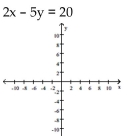
A)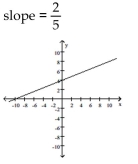
B)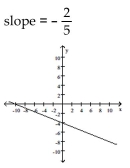
C)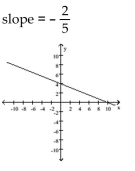
D)

A)

B)

C)

D)


Unlock Deck
Unlock for access to all 224 flashcards in this deck.
Unlock Deck
k this deck
61
Find the vertex form for the quadratic function. Then find each of the following:
(A) Intercepts
(B) Vertex
(C) Maximum or minimum
(D) Range

A)
B)
C)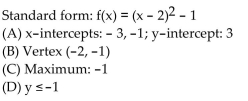
D)
(A) Intercepts
(B) Vertex
(C) Maximum or minimum
(D) Range

A)

B)

C)

D)


Unlock Deck
Unlock for access to all 224 flashcards in this deck.
Unlock Deck
k this deck
62
Find the slope and y intercept of the graph of the equation.
y = x - 2
A) Slope = -2; y intercept = 1
B) Slope = 1; y intercept = -2
C) Slope = 0; y intercept = 2
D) Slope = -2; y intercept = -1
y = x - 2
A) Slope = -2; y intercept = 1
B) Slope = 1; y intercept = -2
C) Slope = 0; y intercept = 2
D) Slope = -2; y intercept = -1

Unlock Deck
Unlock for access to all 224 flashcards in this deck.
Unlock Deck
k this deck
63
Find the slope and y intercept of the graph of the equation.

A)
B)
C)
D)

A)

B)

C)

D)


Unlock Deck
Unlock for access to all 224 flashcards in this deck.
Unlock Deck
k this deck
64
Write an equation of the line with the indicated slope and y intercept.
Slope = -4, y intercept = 6
A) y = -4x - 6
B) y = -4x + 6
C) y = 4x + 6
D) y = 6x - 4
Slope = -4, y intercept = 6
A) y = -4x - 6
B) y = -4x + 6
C) y = 4x + 6
D) y = 6x - 4

Unlock Deck
Unlock for access to all 224 flashcards in this deck.
Unlock Deck
k this deck
65
For the given function, find each of the following:
(A) Intercepts
(B) Vertex
(C) Maximum or minimum
(D) Range
g(x) =
A)
B)
C)
D)
(A) Intercepts
(B) Vertex
(C) Maximum or minimum
(D) Range
g(x) =

A)

B)

C)

D)


Unlock Deck
Unlock for access to all 224 flashcards in this deck.
Unlock Deck
k this deck
66
Provide an appropriate response.
Write the equation of the line in the following graph.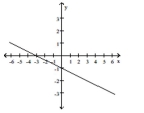
A)
B)
C)
D)
Write the equation of the line in the following graph.

A)

B)

C)

D)


Unlock Deck
Unlock for access to all 224 flashcards in this deck.
Unlock Deck
k this deck
67
For the given function, find each of the following:
(A) Intercepts
(B) Vertex
(C) Maximum or minimum
(D) Range

A)
B)
C)
D)
(A) Intercepts
(B) Vertex
(C) Maximum or minimum
(D) Range

A)

B)

C)

D)


Unlock Deck
Unlock for access to all 224 flashcards in this deck.
Unlock Deck
k this deck
68
Find the vertex form for the quadratic function. Then find each of the following:
(A) Intercepts
(B) Vertex
(C) Maximum or minimum
(D) Range

A)
B)
C)
D)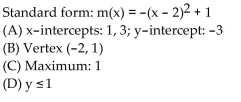
(A) Intercepts
(B) Vertex
(C) Maximum or minimum
(D) Range

A)

B)

C)

D)


Unlock Deck
Unlock for access to all 224 flashcards in this deck.
Unlock Deck
k this deck
69
Write an equation of the line with the indicated slope and y intercept.

A)
B)
C)
D)

A)

B)

C)

D)


Unlock Deck
Unlock for access to all 224 flashcards in this deck.
Unlock Deck
k this deck
70
Write an equation of the line with the indicated slope and y intercept.

A)
B)
C)
D)

A)

B)

C)

D)


Unlock Deck
Unlock for access to all 224 flashcards in this deck.
Unlock Deck
k this deck
71
Find the slope and y intercept of the graph of the equation.

A)
B)
C)
D)

A)

B)

C)

D)


Unlock Deck
Unlock for access to all 224 flashcards in this deck.
Unlock Deck
k this deck
72
Write an equation of the line with the indicated slope and y intercept.

A)
B)
C)
D)

A)

B)

C)

D)


Unlock Deck
Unlock for access to all 224 flashcards in this deck.
Unlock Deck
k this deck
73
Find the vertex form for the quadratic function. Then find each of the following:
(A) Intercepts
(B) Vertex
(C) Maximum or minimum
(D) Range

A)
B)
C)
D)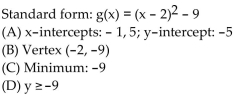
(A) Intercepts
(B) Vertex
(C) Maximum or minimum
(D) Range

A)

B)

C)

D)


Unlock Deck
Unlock for access to all 224 flashcards in this deck.
Unlock Deck
k this deck
74
Find the slope and y intercept of the graph of the equation.
y = -4x + 6
A) Slope = 4, y intercept = -6
B) Slope = -6, y intercept = -4
C) Slope = 6, y intercept = -4
D) Slope = -4, y intercept = 6
y = -4x + 6
A) Slope = 4, y intercept = -6
B) Slope = -6, y intercept = -4
C) Slope = 6, y intercept = -4
D) Slope = -4, y intercept = 6

Unlock Deck
Unlock for access to all 224 flashcards in this deck.
Unlock Deck
k this deck
75
Provide an appropriate response.
Use the graph to find the slope-intercept form of the equation of the line.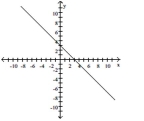
A) y = 3x
B) y = -x + 3
C) y = x + 3
D) y = x - 3
Use the graph to find the slope-intercept form of the equation of the line.

A) y = 3x
B) y = -x + 3
C) y = x + 3
D) y = x - 3

Unlock Deck
Unlock for access to all 224 flashcards in this deck.
Unlock Deck
k this deck
76
For the given function, find each of the following:
(A) Intercepts
(B) Vertex
(C) Maximum or minimum
(D) Range

A)
B)
C)
D)
(A) Intercepts
(B) Vertex
(C) Maximum or minimum
(D) Range

A)

B)

C)

D)


Unlock Deck
Unlock for access to all 224 flashcards in this deck.
Unlock Deck
k this deck
77
Write an equation of the line with the indicated slope and y intercept.
Slope = 1; y intercept = 6
A) y = 6x + 1
B) y = 6x - 1
C) y = x + 6
D) y = -x + 6
Slope = 1; y intercept = 6
A) y = 6x + 1
B) y = 6x - 1
C) y = x + 6
D) y = -x + 6

Unlock Deck
Unlock for access to all 224 flashcards in this deck.
Unlock Deck
k this deck
78
Find the slope and y intercept of the graph of the equation.
y = 52 x - 72
A)
B)
C)
D)
y = 52 x - 72
A)

B)

C)

D)


Unlock Deck
Unlock for access to all 224 flashcards in this deck.
Unlock Deck
k this deck
79
Write an equation of the line with the indicated slope and y intercept.
Slope = 3, y intercept = -6
A) y = -3x - 6
B) y = 3x - 6
C) y = 6x + 3
D) y = 6x - 3
Slope = 3, y intercept = -6
A) y = -3x - 6
B) y = 3x - 6
C) y = 6x + 3
D) y = 6x - 3

Unlock Deck
Unlock for access to all 224 flashcards in this deck.
Unlock Deck
k this deck
80
For the given function, find each of the following:
(A) Intercepts
(B) Vertex
(C) Maximum or minimum
(D) Range
f(x) =
A)
B)
C)
D)
(A) Intercepts
(B) Vertex
(C) Maximum or minimum
(D) Range
f(x) =

A)

B)

C)

D)


Unlock Deck
Unlock for access to all 224 flashcards in this deck.
Unlock Deck
k this deck



